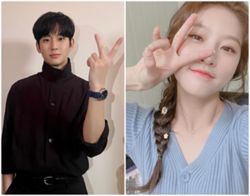
The 'I Am Not A Typo' campaign launched in the UK in March with an open letter to tech giants and public ads backing a presence in UK media and social media. — Photo: I Am Not A Typo/dpa
LONDON: "My name is Cathal, but phones generally try to call me Cathedral or Catholic," says Cathal Wogan.
He's not alone in sharing his frustration at how spell-checkers and autocorrect try to "fix" his name.
Names like Maeva, Bukayo, Caelan, Liyana and Ayda are often seen with a red line under them, suggesting they need correcting. Meanwhile, the likes of Anne, Nigel, William and Susan are seen as accepted spellings, according to a new awareness campaign in the UK.
The "I Am Not A Typo" campaign launched in the UK in March with an open letter to tech giants and public ads backing a social media presence, all aimed at getting tech companies to adapt their language software to the reality of social diversity.
The problem doesn't stop with squiggly red lines still appearing under many people's names, say campaigners, who argue that the social and psychological impact goes beyond a minor nuisance to people whose names aren't canonical.
In messaging and email apps like WhatsApp, Gmail and iMessage, autocorrecting keyboards autonomously change many names into what the software assumes is the intended word.
"Our collaborators Dhruti and Rashmi are respectively autocorrected to Dorito and Sashimi," Wogan, a spokesman for the campaign, told dpa.
About two in five (41%) of the names given to children in England and Wales are "incorrect" according to Microsoft’s English (UK) dictionary, the campaign's initiators say. Microsoft declined to comment when approached by dpa.
Since launching, campaigners have heard "hundreds upon hundreds" of stories from people whose names are not recognised, says Wogan.
"The red line bothers me. I didn't choose the 'wrong' name for my child," the campaign quotes one contributor as saying. Another says autocorrect "recalls the mocking I received in childhood, growing up in England with a non-English name."
The activists give the example of the name Nigel, typically recognised by language software, despite only 36 children being named Nigel in the UK in the past five years.
Meanwhile, Esmae, the name given to 2,328 children in the UK in the last five years, is not recognised. As such, the red line itself is an example of modern-day social bias, organisers argue.
"For some it might be harmless. Maybe even funny. But for a lot of people, it’s a denial of their culture, or a reminder that they are different, or a sign that their phone or their laptop wasn't built with them in mind," Wogan says.
"And that is indicative of wider society, and wider social and cultural ills related to race, ethnicity, religion and culture."
Although based in the UK, the campaign says the phenomenon of technology reflecting the prevailing hegemony, rather than the actual multicultural societies it functions in, is a global one.
"Germany is a great example of a thriving, diverse society in which a German dictionary may not recognise a name of Turkish or Ukrainian or Syrian origin as valid, even when those names are increasingly popular and present in the country."
Wogan says the campaigners are now in contact with major tech companies about adapting software, but believe continued efforts to increase public awareness of the issue will put pressure on major tech companies.
"One of the main reasons that we are campaigning is to bring this issue to light publicly so that there is no plausible deniability around spell-check and autocorrect’s shortcomings." – dpa









































